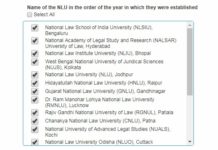[25th and 26th of August are the two days on which NALSAR won’t be the way it generally is. The reason? NALSAR Film Festival – A first of its kind by any Law School of this country. Written by Sanya Samtani (Batch of 2015), this piece takes you on a mellifluous tour of what one is expected to witness and experience during the fest. If there’s any possibility for you to be there, don’t miss it. We’d be lying if we tell you that you won’t regret not attending this.]
As a law aspirant, I romanticized the national law schools to a very large extent. I’d catch myself daydreaming in the middle of a men and days problem (always hated those), wondering what amazing experiences lay ahead of me if I worked hard enough. Of course these day dreams were fuelled with random snippets of ‘legal’ news that I’d read in the newspaper, with the short conversations that I’d have with my school seniors who had managed to ‘crack’ the CLAT and get into one of the national law schools, or, more truthfully, from their Facebook profiles that I used to religiously stalk.
Of course, when I did get into NALSAR, reality hit hard. But fast-forward about two years and things look like they might just touch the ‘d’ of my daydreams. The new ‘academic revolution’ coupled with a renewed enthusiasm for international relations (enthusiasm always multiplies when you find someone who shares your passion, needle-in-a-haystack), and of course a resurgence of academic vigour when you’re provided with the freedom to write a paper on the Question of Equity and Mercy in Harry Potter, allowed me to believe that there was a sliver of hope, that I could live out my daydream, even it it was only a small one. The NALSAR Film Festival is another one of those events that add to my vision of what I thought law school would be like. Imagine attending – no wait, organizing – an event where you get to watch films that are made by socially motivated directors, some even critically acclaimed, AND discuss said films with the directors themselves ! Every single detail, from how Sanjay Kak tells the story of the controversy surrounding the numerous interrupted screenings of his film, to how R. R. Srinivasan fled to Bangalore as he was shooting his film, since he was being hounded for his views on caste, to the experience that Deepa Dhanraj had at the women’s Jamaat in a village in Tamil Nadu, is exhilarating.
I find it tiring – and I’m sure that even the best of us, the most attentive, will admit that sitting through lectures, however stimulating the lectures are, and however interesting the discussion is, can get monotonous after a period of time. Whilst there is a lot to gain from airing opinions, albeit informed opinions in the course of class discussions, you gain something of a completely different nature when you watch – no, experience a film, and then discuss it. The sort of interaction that a well-made film has with a keen audience, and consequently the audience has with himself or herself, and in this case the directors, is very different from the everyday classroom interaction between a teacher and a student. One finds that there is that personal touch to the issue, because the director has put a bit of himself or herself in the film, and so has the audience, and that interplay, I feel, is an interesting one to experience, especially with films that inevitably engender discussion – such as, Partners in Crime, a film by Paromita Vohra on the copyleft movement and piracy as a class struggle; Oishik Sircar and Debolina Dutta’s Amra Padatik (We are Foot Soldiers) on the issue of a child’s perspective on his or her parent’s job as a sex worker, and the subsequent question of agency in sex work that is dealt with in Shohini Ghosh’s Tales of the Night Fairies; Izzatnagari ki Asabhya Betiyaan, or the Immoral Daughters in the Land of Honour by Nakul Sawhney and Deepa Dhanraj’s Invoking Justice that shows the subversive side of a set of women, who have displayed extraordinary courage to against all odds, to achieve their goal, be it representation or a complete upturn of the narrative of victimhood that often lends itself to this discourse; All About Famila, Chalam Bennurakar’s film about the transgender community and the life of Famila, and how she sought liberation as a woman whilst born as a man; Chalam’s other film, Kutty Japanin Kuzhandaigal (The Children of Mini-Japan) that throws light on the dire situation that the child labourers in the match and fireworks factory are in; Subasri Krishnan’s This or That Particular Person, on interrogating how the State views identity with regard to the UID scheme; R.P. Amudhan’s Notes from a Crematorium on the social ostracism faced by the Undertaker community, that they are only needed by the dead, and not the living; the Manjolai massacre, that occurred when tea estate workers asked for a wage-hike in Death of a River by R.R. Srinivasan, and of course, the most poetic of them all, Kak’s Jashn-e-Azadi, or Celebration of Freedom, that seeks to talk of the Kashmiri conflict, and questions our concepts of democracy and freedom, by examining the tension in Kashmir, and attempts to give the people of Kashmir an avenue through which they can voice their pain, as opposed to being commonly portrayed as helpless individuals that are caught in the crossfire.
The highlight, however, is that in addition to the films that are being screened, Parnab Mukherjee, a highly acclaimed one-man-show from Kolkata, is performing excerpts from Mahasweta Devi’s plays, and in my opinion, will be the most innovative act of them all. After all, what better to set the tone of the festival than theatre – tangible emotions that one can see before one’s eyes – in the flesh.
Finally, to encourage dialogue across barriers, this year’s film festival, in association with the Centre for Legal Philosophy and Justice Education, the NALSAR Alumni Association and GAIL, will see participation from students of various disciplines – from engineering, arts, mass communication, film studies, and of course, law. It seems like there is going to be a massive collision – of perspectives, views and paradigms, and I’m looking forward to it. There are also some NGOs and professors who are attending the festival, along with a few noted intellectuals in their own fields that have been invited for the panel discussions.
The law school that I daydreamed of, may not ever exist. But events such as these remind me that sometimes, dreams aren’t that far off from reality – that there can be an academic culture that will see students in heated discussions on watching a film that provoked them into airing their views, and most of all, that learning needn’t take place in a classroom, and that an educational institution has finally recognized that.
We would love for you to attend the film festival, if you are in Hyderabad for the weekend. Entry is free, and open to all. Please visit our website if you’d like to know more about the festival : www.nalsarfilmfestival.com
If you live in Hyderabad and want to attend the NALSAR film festival but have questions, call us : Anindita (+91 8008906333) Aymen (+91 9160903538) Sanya (+919705055607)














